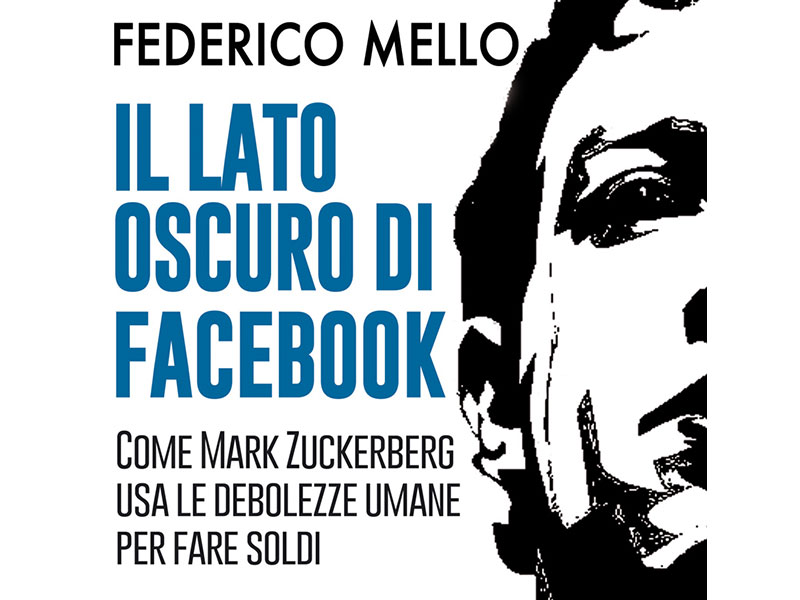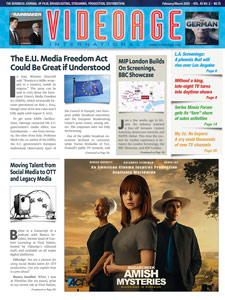Il Lato Oscuro di Facebook, which can be translated as Facebook’s Dark Side (Imprimatur Publishing Company, 126 pages, 14 euro), by Italian journalist Federico Mello, is a brief Italian-language treatise examining fundamental questions posed by Facebook, the undisputed world leader of the Social Media revolution.
Is the satisfaction of receiving a notification on Social Media addictive? Are there ethical and sociological implications if a company profits from this addiction? And, going over to the “dark side” for a moment, what if a company collects your habits and preferences and compares them with others in order to keep you hooked on a process that generates revenue? These are just some of the many questions the book tries to answer.
Facebook’s lax terms of service allowed user data to be exploited by commercial data aggregators precisely that way, prompting high-profile scrutiny from lawmakers in both the United States and Europe once these problems became public.
But Facebook has, as of yet, largely escaped concrete consequences. The company, after all, exists on untrodden ground: Where and when is there a precedent for a person, place, or thing that generates as many social interactions as Facebook does?
Over the past few months, Facebook has implemented a new advertising and communications strategy designed to reassure worried consumers, investors, and advertisers. Author Mello observes that of the three groups mentioned above, consumers are the least of Facebook’s worries. Government scrutiny has only really caused users to reduce their time on Facebook by two minutes each (although this average could hide larger individual variations). Because, as Facebook itself says in its latest self-promotion, “When this place does what is was meant to do, it brings people closer together.”
Mello comments that, while the company once apologized for allowing advertisements, explaining in a statement announcing the introduction of advertising banners that “they help us keep the lights on” — it has had an obligation to its shareholders (since the company’s 2012 Initial Public Offering) to maximize profits, and much of those profits come from advertising. Facebook is no longer a tool for Harvard students to connect. Today, Facebook sells attention — the attention it can capture from people.
Between coworkers’ birthday party pictures and friends’ vacation updates, Facebook can insert advertising content that, if successfully aligned with user information (foremost of which is the content the user already interacts with), will elicit a reaction, and, if sufficiently interesting, prompt an interaction ranging from a click-through to the advertisers’ site to sharing the content with one’s own friends on Social Media.
Mello is a meticulous journalist who shields his assertions with an extensive bibliography, and has written an audacious contemporary examination of a company that might frighten authors with a different profile. It may be easier for him to be the one to do this since he is, after all, writing in Italian for a small publisher (the Reggio Emilia-based Imprimatur). This means he is also writing for his audience: Italians use Social Media as much as anyone else, but not everyone amongst the country’s aging population will be predisposed to embracing this new medium enthusiastically. He has a need to explain the issues impacting Facebook while also unobtrusively explaining what Facebook itself is and how it operates, a complicated task given the fact that Facebook is constantly reimagining its features and the words used to label it.
This too, is a consequence of Facebook’s ultimate existence as a corporation that, as most modern companies do, arms itself with countless teams of psychologists and marketers dancing around its engineers. They thus endlessly change features and interfaces in order to address the desires of advertisers and the convenience of users.
Facebook is tracking interactions that otherwise would not have existed. But the power of Social Media is self-evident; it is impossible to argue that connecting people has not had a tangible and irreversible impact on people’s lives. A single update to a politician’s Social Media page can not only galvanize thousands of activists, but also reach ordinary people. This much was made clear over the course of political upheavals that took place over the past decade. From protests in Tahrir Square bringing about a change of government in Egypt to inflammatory content influencing American voters in the last election, the methods and modes of social discourse have changed for good. For it is not only politicians who can broaden their bases, but corporations that can reach more consumers, artists that can raise awareness for their work, and news media that can share stories.
A few years ago, this writer experienced a very telling example of one of the millions of small ways Social Media has impacted consumers. As all Italians do, I steadfastly follow a lower-division Italian football (soccer) team whose matches are only broadcast on a small local TV station. A team supporter mounted a webcam in front of his television set and began streaming matches live for the benefit of the small but steadfast fans residing abroad. But halfway through the season, the Facebook group where this all took place was shut down. The streams reappeared on a new Facebook group soon after, but that too was shut down (probably at the request of the broadcaster). The “streamer” then moved to a different Social Media network.
The following season, the League introduced an online subscription service, and the illegal streams stopped. One can only wonder if the distributor of that team’s minor-league TV sports rights would have thought that there was a way to reach viewers outside a regional TV station if they hadn’t seen someone pirating their broadcasts.
Do we really need a book like Mello’s? It’s always interesting to examine precisely how a social media network makes money, especially for readers outside the United States, where Social Media burst onto the scene much more fully-formed. But, while we like to think that Social Media has had a rapid and surprising impact on our lives, at the end of the day Facebook has been around for over a decade. Everyone already has an opinion on the usefulness or validity of their Social Network of choice.
(By Yuri Serafini)












Leave A Comment